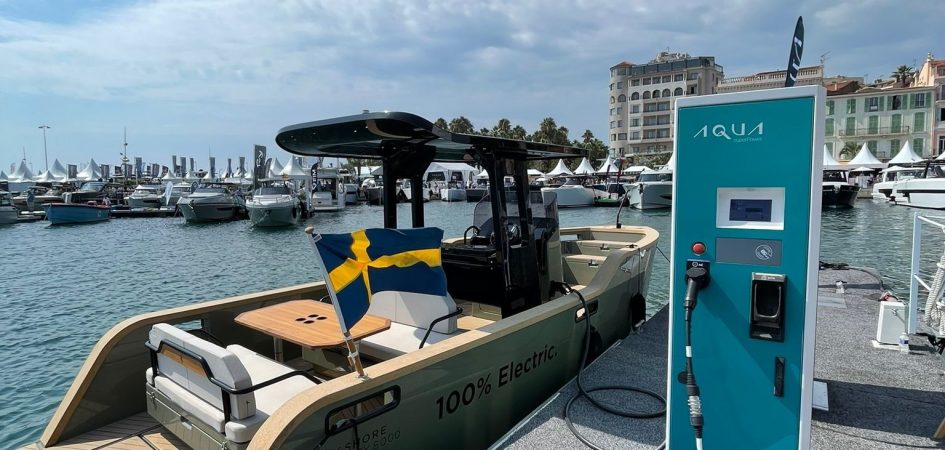
Published on: 14 October 2021

Aqua superPower is the first fast-charge network company to be awarded a grant under the Clean Maritime Demonstration Competition, funded by the Department for Transport and delivered with Innovate UK. Plymouth is set to install a network of shore-side charging facilities for its expanding fleet of electric maritime vessels. Over the past year, the city has become home to the UK’s first marine electric passenger ferry and an electric water taxi that will operate 364 days a year. The project is led by the University of Plymouth in partnership with Plymouth City Council, Princess Yachts Limited and Aqua superPower.
Plymouth’s Marine e-Charging Living Lab (MeLL), will provide the pivotal infrastructure required to accelerate innovation and growth, with Aqua bringing its DC fast-charge network knowledge and technology to the scheme that will further Plymouth’s reputation as a centre of excellence in clean maritime innovation. The project has received more than £570,000 funding and will develop a network of charging facilities around Plymouth Sound, offering multiple, flexible sites and responding to the Maritime 2050 route map for maritime net zero.
Aqua won the bid as technology partner to the project with a high caliber team that brings an unrivalled track record in electric charging infrastructure in the EV sector with them to now be developing the world’s first dedicated marine fast charge network. CEO Alex Bamberg has over 20 years’ experience in cutting edge sustainable transport, emission regulations and energy markets. Aqua superPower already supports marinas, boat builders and boat owners in the drive to bring electric power to the water and reduce the impact of boating on our marine ecosystems.
“We very much look forward to contributing to the success of this very important project, which perfectly fits with Aqua superPower’s mission to reduce the impact of boating on the marine environment through the development of an all-electric and integrated ecosystem of marine superchargers.” says Alex Bamberg, CEO of Aqua superPower. “We are privileged to work with our partners, the University of Plymouth, Plymouth County Council and a premiere yacht manufacturer like Princess Yachts. In deploying our dedicated marine fast charge network as part of the project, we are creating the right landscape towards decarbonisation of the marine environment. “
Professor Will Blake, Director of the Sustainable Earth Institute at the University of Plymouth, said: “This is an exciting project that has the real potential to showcase Plymouth as a trail blazer in clean maritime innovation. It builds on our existing partnerships and shows that there is a concerted effort to make positive and lasting changes that will benefit both our city and the environment as a whole. The University has a long track record of using its world-leading sustainability research and partnerships to both highlight challenges and develop new ways of working. This project, and the opportunities it brings, is the perfect way to continue expanding that work.”
Councillor Jonathan Drean, Cabinet Member for Transport at Plymouth City Council, said: “This is a big deal – not just for the Council and its partners – but for our sizable maritime community from weekend anglers to the fishing crews, who I hope will be looking at this with real interest. We need to plan for a future that is less reliant on fossil fuels and our marine sector can play a key role in ensuring a greener future. This exciting project fits in so well with so many of our city aspirations to tackle climate change through our Climate Emergency Action Plan, but to also encourage more people to enjoy the waters around Plymouth, through our National Marine Park status. It’s also putting Plymouth’s name out there as a city that’s innovative, that’s prepared to support and invest in the right infrastructure that could lead to a significant step towards becoming more sustainable. If we are asking businesses, organisations and individuals involved in our marine economy to go greener, we need to make it as easy as possible for them to do this. That’s what this project is about.”
Between now and March 2022, the project will identify suitable locations for charging facilities that can be easily linked to the National Grid while meeting both consumer and commercial demand. It will also develop and deploy an array of sensor technologies that can assess the environmental and operational impacts of e-charging. This is the start of a network originating from Plymouth to build a marine e-mobility corridor and establishing a centre of excellence in marine charging.
The winners of the Clean Maritime Demonstration Competition were announced in Greenwich, the heart of British maritime, on the state-of-the-art Royal Navy ship HMS Albion on 15 September.
The Transport Secretary outlined how this is the latest in a string of government initiatives aimed at cutting emissions in the sector as part of London International Shipping Week – including joining other nations in supporting a world-leading absolute zero target for international shipping emissions by 2050.
Transport Secretary Grant Shapps, said: “As a proud island nation built on our maritime prowess, it is only right that we lead by example when it comes to decarbonising the sector and building back greener. The projects announced today showcase the best of British innovation, revolutionising existing technology and infrastructure to slash emissions, create jobs and get us another step closer to our decarbonisation targets.”
Simon Edmonds, Deputy Executive Chair and Chief Business Officer for Innovate UK, added: “As the UK prepares to host COP26 in the maritime city of Glasgow, it is great that we can announce funding for some fantastic projects in the maritime sector that will help the UK meet its net zero goals. From the Clean Maritime Demonstration Competition we saw a very high level of demand, and we have seen the very best of British ideas from all over the country. It is clear that not only does the UK have a great maritime history, but also a bright and greener future too.”

